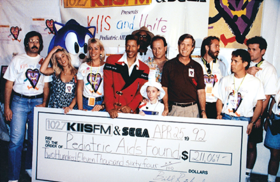Sega Foundation
From Sega Retro

| ||||
| Sega Foundation Division of Sega of America | ||||
|---|---|---|---|---|
| Founded: 1992-12[1][2] | ||||
| Defunct: 199x | ||||
Headquarters:
| ||||
1992
|
This teeny-tiny article needs some work. You can help us by expanding it.
The Sega Foundation was a charitable foundation established by Sega of America as the official face of the company's philanthropic efforts, and a continuation of the earlier Sega Youth Education and Health Foundation.
History
| “ | Since 1992 the Sega Foundation has been committed to supporting those youth education and health organizations seeking the next level of success and well-being for American youth. | „ |
— Sega Foundation[1] | ||
The Sega Foundation was officially established in December 1992[1][2] as the official front for Sega of America's charitable contributions. A continuation of the earlier Sega Youth Education and Health Foundation, it was a more formal and codified charitable foundation that its predecessor, and arguably much more visible. More than a simple charity organization, Sega of America's corporate tenacity and experience fighting uphill battles informed how their handling of the Sega Foundation, resulting in a charitable front that was more willing to take risks than others.
Most notable among their efforts was their early support of children with pediatric AIDS. At the time, AIDS was a taboo subject and poorly-understood, with many Americans seeing the condition as toxic or infectious. As a result, many companies of the era tended to shy away from HIV/AIDS-related charity. KIIS FM, a Southern Californian radio station with ties to Sega of America, wanted to change this perception. However, they were struggling to acquire sponsors due to the stigma surrounding the condition, and reached out to Sega of America in the hope they'd understand. Thankfully, Al Nilsen liked the idea and agreed on behalf of the company to sponsor a charity concert. President Tom Kalinske agreed, giving the sponsorship the green light to proceed with what would become KIIS and Unite.[4]
Magazine articles
- Main article: Sega Foundation/Magazine articles.
External links
- Official website (Wayback Machine)
References
- ↑ Jump up to: 1.0 1.1 1.2 http://www.sega.com/central/foundation/ (Wayback Machine: 1998-02-02 03:35)
- ↑ Jump up to: 2.0 2.1 2.2 http://www.nonprofitfacts.com/CA/Sega-Youth-Education-Health-Foundation-Charitable-Tr-032392-Rioux-Paul-Ttee.html
- ↑ http://www.sega.com/central/foundation/gonna/ (Wayback Machine: 1997-06-30 06:44)
- ↑ B Harris (2014). Console Wars, pg. 255
